FREE Training: How to Launch Your Property Management Company
Starting any business from the ground up can be intimidating and complex, and this is especially true of property management.
From finding clients to understanding the local state regulations, the initial steps can feel like a confusing maze that is difficult to navigate if you are not equipped with the proper guidance, research, and resources that you will need to succeed.
So, to help you sidestep the common pitfalls that many new property managers experience, we have put together our own comprehensive guide on launching an Indiana property management company.
In this blog post, we will be outlining all of the essential factors for long term success in the world of property management.
So, let’s dive in!
What Does an Indiana Property Management Company Do?
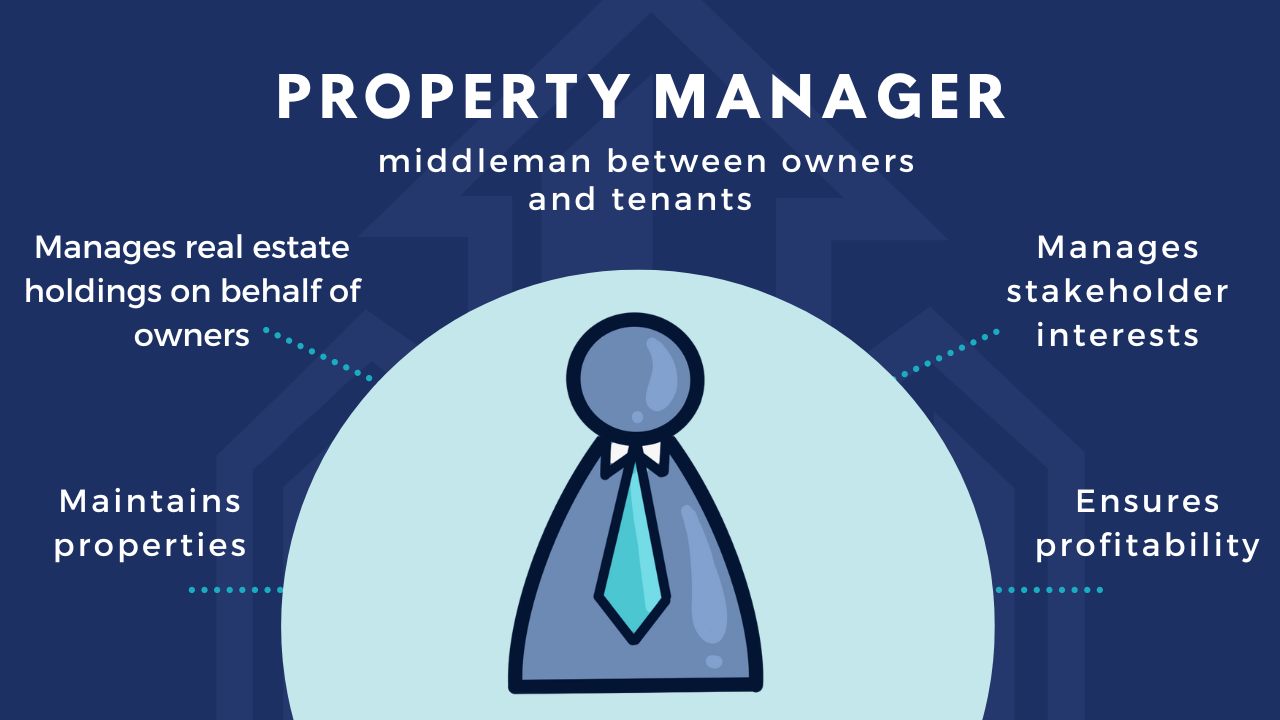
A property management company in Indiana oversees various rental properties on behalf of owners and landlords.
This means that property managers serve as a crucial intermediary between landlords and tenants.
Typically, these property managers take care of everything from smaller apartments to large condo developments, as well as single-family homes.
Property managers interact with owners, tenants, potential tenants, and maintenance contractors on a daily basis, balancing all parties’ interests to make sure that the property remains profitable, everything remains legally compliant, and tenants are happy.
Since property management is so rooted in your ability to create positive relationships, you will need strong communication skills and patience to succeed.
Property management companies will often vary in size. This means that you could run a one-person operation, or you can choose to expand and build a larger company.
IMAGE
Now that you understand what exactly a property manager in Indiana does, let’s dive into all the necessary steps that you will need to take in order to start your own property management company.
1. Set Up Your Business Structure
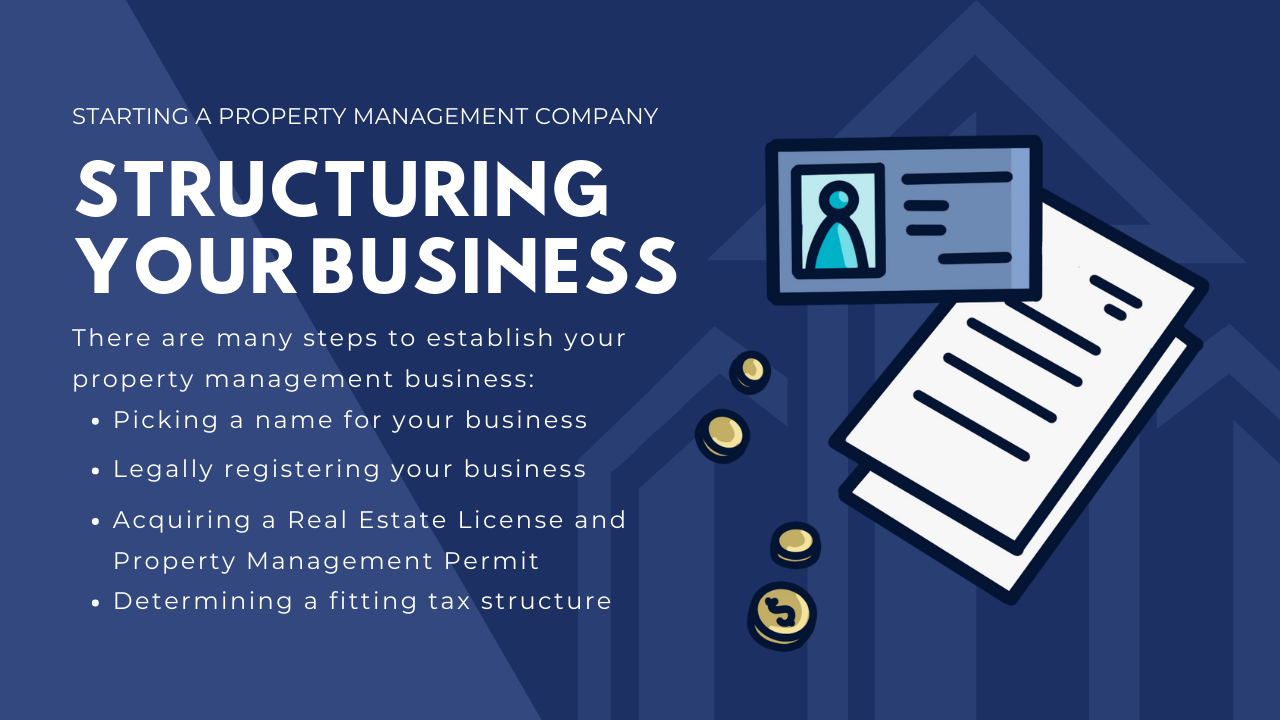
The first step towards establishing your property management company is selecting a great name and officially registering your business.
Navigating the legal details of setting up a business entity in Indiana can pose its own set of challenges, so consulting with a corporate accountant or tapping into resources such as your local Chamber of Commerce is highly recommended.
Next, you will want to come up with your business plan. Crafting a strong business plan is the best way to ensure that you are making informed decisions regarding your business structure and protecting you and your business against personal and professional liabilities.
It is also worth noting that each state, including Indiana, will have their own set of legal requirements for establishing a business, and this is especially true when it comes to property management.
Property Management Certification in Indiana
Now, before you get started managing properties, you will need to make sure that you are qualified to do so. Property Management Certification in Indiana mandates obtaining a Real Estate Broker License.
To qualify for the Indiana Broker License examination, you must either possess a four-year college degree or provide evidence of employment as a licensed real estate salesperson.
Additionally, you need to complete at least eight college-level courses in real estate before you can sit for the Indiana Broker License examination.
The fee to take the Indiana Broker License examination is $95. Upon passing the examination, you will be required to pay a $300 licensing fee and a $51 fee for fingerprint processing.
Choose A Structure
Once you are certified and equipped with a business plan, you will need to choose a structure for your property management company.
Choosing the ideal business structure is crucial. Many property management firms opt for Limited Liability Corporations (LLCs) or unincorporated entities (commonly referred to as S-Corps or C-Corps).
We highly recommend seeking guidance from legal or financial experts who are well-versed in corporate tax filings to help you determine the best structure for your property management company.
Once you have officially established your business and tax structure, you can start all of the necessary legal processes that will be put in place to protect all of your assets, your business, and yourself as you move through your journey as a property manager in Indiana.
FREE Training: How to Launch Your Property Management Company
2. Create a Strong Legal Contract
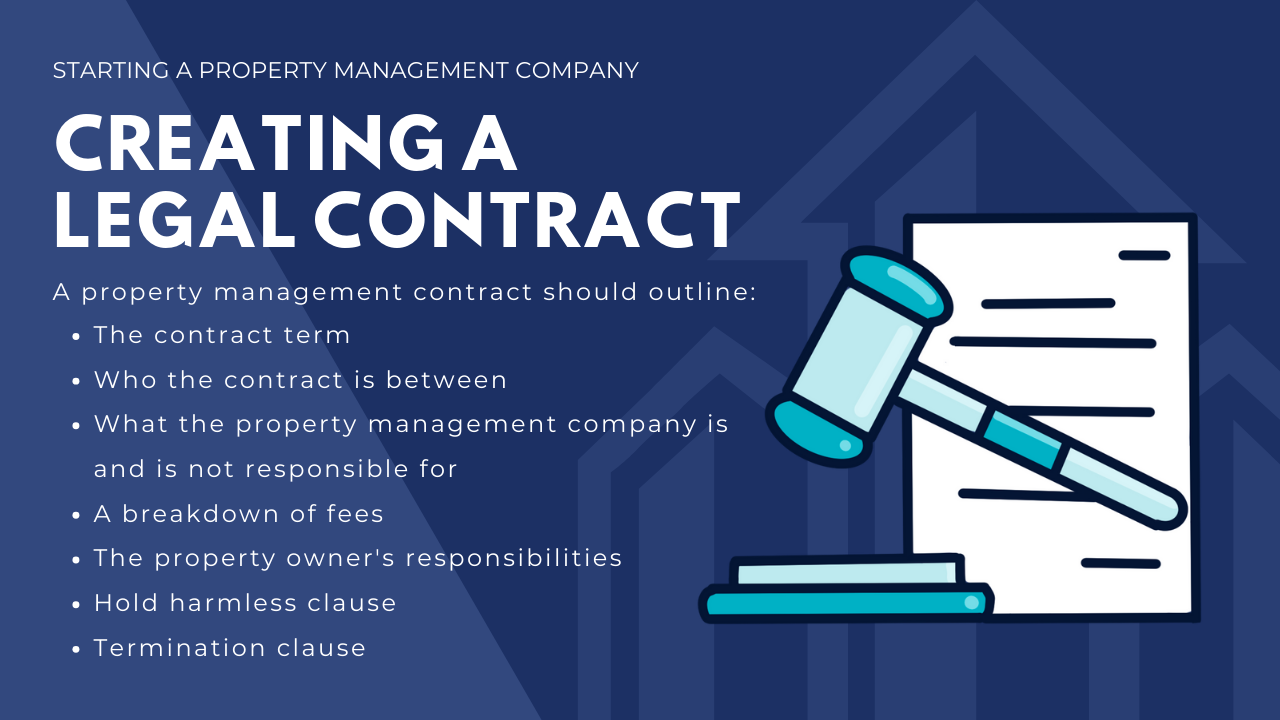
Once your company is officially registered as a legal entity and you have started shaping its organizational framework, the next step is creating a strong, legally-binding contract for your clients in Indiana.
We strongly advise beginning this process early on in your journey, as it may take a significant amount of time and financial investment, particularly in attorney fees.
Working closely with a specialized attorney in property management will help you make sure that everything is done correctly and that you will have comprehensive protection against liabilities, fraud, and the other risks that can often come with being a property manager.
So, what makes a solid contract for property management?
A Property Management Contract Should Clearly Outline the Below:
- The duration of the contract.
- A list of all the parties involved in the contract (your company and the property owner).
- A detailed list of the responsibilities that belong to the property management company, including property maintenance, tenant acquisition, rent collection, repairs, emergency maintenance, and other ongoing monthly duties.
- A detailed list of exclusions from the property management company’s responsibilities.
- A breakdown of fees owed by the property owner to the management company.
- A list of duties and obligations of the property owner.
- The inclusion of a hold harmless clause, absolving one or both parties of legal liabilities in case of injuries or damages incurred during the contract period.
- A termination clause that specifies the conditions under which either party can dissolve the contract with or without penalties.
By clearly outlining these details in your contract, property managers can not only establish clarity and transparency with their client, but also have a legal safeguard put in place to protect both parties involved.
FREE Training: How to Launch Your Property Management Company
3. Create a Detailed Business Plan and a Scalable Structure
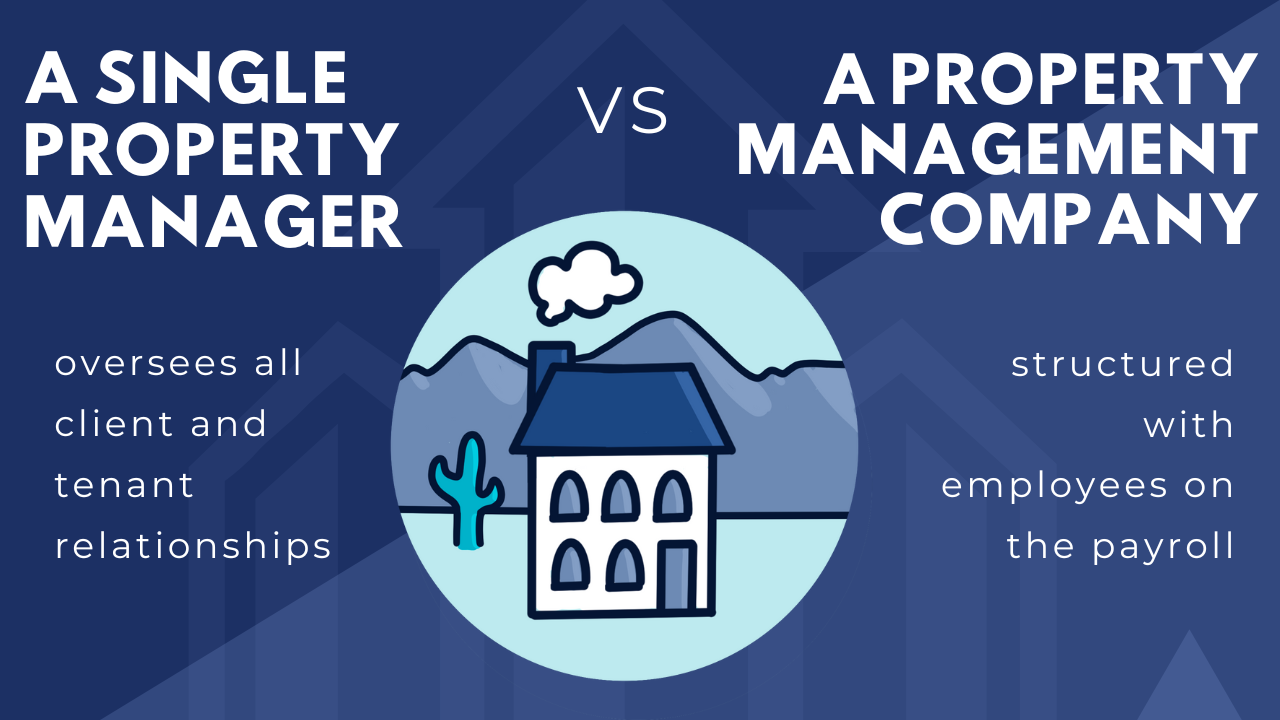
As you continue to establish your property management company in Indiana, it is crucial to consider both your short and long-term goals and develop a strategy to scale your business accordingly. Property management companies typically adopt one of two structures:
- Single Property Manager Model: In this model, a single property manager oversees all client and tenant relationships. They may delegate tasks to other businesses or contractors.
- Employee-Based Property Management Company: This structure involves having employees on the payroll, ensuring a more even distribution of work. Each employee can focus on specific aspects of the business.
While these are the most common structures, flexibility is key if you are wanting long term success in property management.
Many property managers start as sole proprietors, working with contractors and other businesses to manage their workload.
Then, as the business grows, the focus shifts towards hiring salaried employees and establishing a structured hierarchy within the company.
When you are in a place where you can begin to expand your property management company, you will want to onboard a team of professionals to help you take care of all the details and make sure that nothing slips through the cracks.
Once you reach this point in your business journey, here are some roles that you may want to fill in your company:
- Additional property managers tasked with overseeing multiple properties. These experts act as general property managers, ensuring top-tier service for each client.
- Administrative support to help make your office space and daily operations more efficient
- Sales representatives dedicated to nurturing client relationships and attracting new ones.
- Human resources specialists managing payroll and benefits for both full-time and part-time employees.
- Finance professionals handling accounts payable and accounts receivable.
- Leasing agents, showing coordinators, and tenant managers adept at managing tenant relations and securing new tenants when needed.
- Maintenance managers and staff equipped to handle routine and emergency maintenance and repairs.
- Service coordinators facilitating seamless operations.
- Marketing specialists to help you in website development, social media management, and creating impactful marketing materials for your business.
Additionally, certain contract-based roles are vital, such as:
- An experienced accountant
- A real estate attorney or law firm
- Contractors for specialized maintenance tasks
- Information technology (IT) staff
It is absolutely essential to ensure that all of your vendors, employees, and contractors are properly registered, qualified for their roles, and adequately insured. Your contracts should outline liability and responsibilities clearly.
At the end of the day, the quality of your team ultimately reflects your business, so thorough research is crucial when hiring.
Only bring on qualified and professional partners if you wish to maintain the integrity and reputation of your property management company in the long run.
FREE Training: How to Launch Your Property Management Company
4. Incorporate Property Management Software
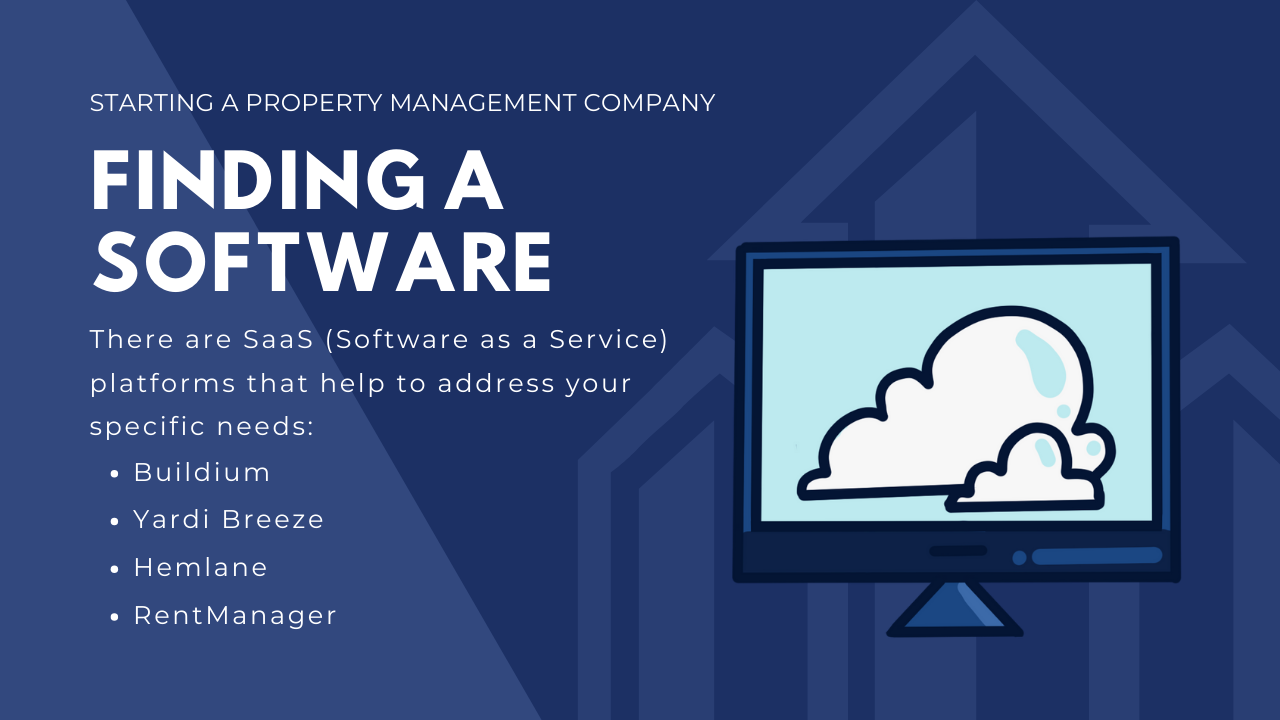
As a property management company, you will encounter a multitude of competing priorities demanding your attention every hour, every day.
Given the nature of your relationship-based business, staying responsive and professional must remain a priority.
After all, your relationships with clients and tenants will affect your overall reputation in the industry, and your reputation is often your greatest asset as you continue to grow.
The thing is, addressing these priorities efficiently requires the right tools.
Fortunately, there’s a software solution for every business need, and property management companies are no exception.
For this reason, it is essential to choose software that can seamlessly adapt to your current and future business requirements.
While there are comprehensive property management software options like Buildium, Yardi Breeze, Hemlane, and RentManager, these may seem overwhelming, especially for startups.
However, there are alternative SaaS platforms tailored to specific needs such as tenant rent collection, maintenance order tracking, email organization, and document sharing.
Although these individual platforms may not offer the same level of integration as comprehensive software, they are often more cost-effective and can help facilitate business scalability during the initial stages of your company.
With some research, you can find a suitable SaaS solution to support your property management company’s needs effectively.
5. Effectively Market Your Property Management Company

One of the most widespread misconceptions across all industries is the belief that once you have attracted and retained clients, your marketing efforts can cease. However, this couldn’t be further from reality.
Marketing your new property management business should be an ongoing effort, requiring dedicated resources and staff time.
We strongly advocate for investing in a strong marketing strategy right from the start to ensure both short and long-term success.
In order to establish yourself as a credible business, it is essential to build a strong digital and local marketing presence.
In fact, many property managers choose to delegate marketing tasks to agencies or freelance professionals.
Regardless of whether you are handling your marketing in house or if you end up seeking help from a professional, the key priorities in your marketing strategy should include the following:
An Engaging and Informative Website
In today’s digital age, a high-quality website serves as the digital storefront for your business.
First impressions are crucial, and a professional, informative, and well-designed website can significantly impact your ability to attract clients from the outset.
While platforms like WordPress, Squarespace, and Wix offer templates for DIY websites, we recommend considering professional assistance to elevate your online brand and leverage your website as a revenue-generating asset.
Strong Marketing Collateral
Marketing collateral encompasses various materials that promote your business, including social media posts, brochures, downloadable guides, ads, business cards, blogs, and other related materials.
While your website takes precedence, these materials can help you establish professionalism and a strong brand identity for your new venture.
Networking Opportunities
While digital marketing is a crucial aspect of advertising your business in our modern economy, networking in real life remains a vital aspect of marketing for property managers.
Building relationships with real estate professionals and investors can lead to valuable industry contacts and potential clients.
Active participation in professional organizations such as the National Association of Residential Property Managers is recommended, as it provides valuable industry insights, training, resources, and networking opportunities.
Take the time to research what events you can go to in order to network with other Indiana real estate professionals.
FREE Training: How to Launch Your Property Management Company
6. Establish Your Property Management Company’s Fee Structure
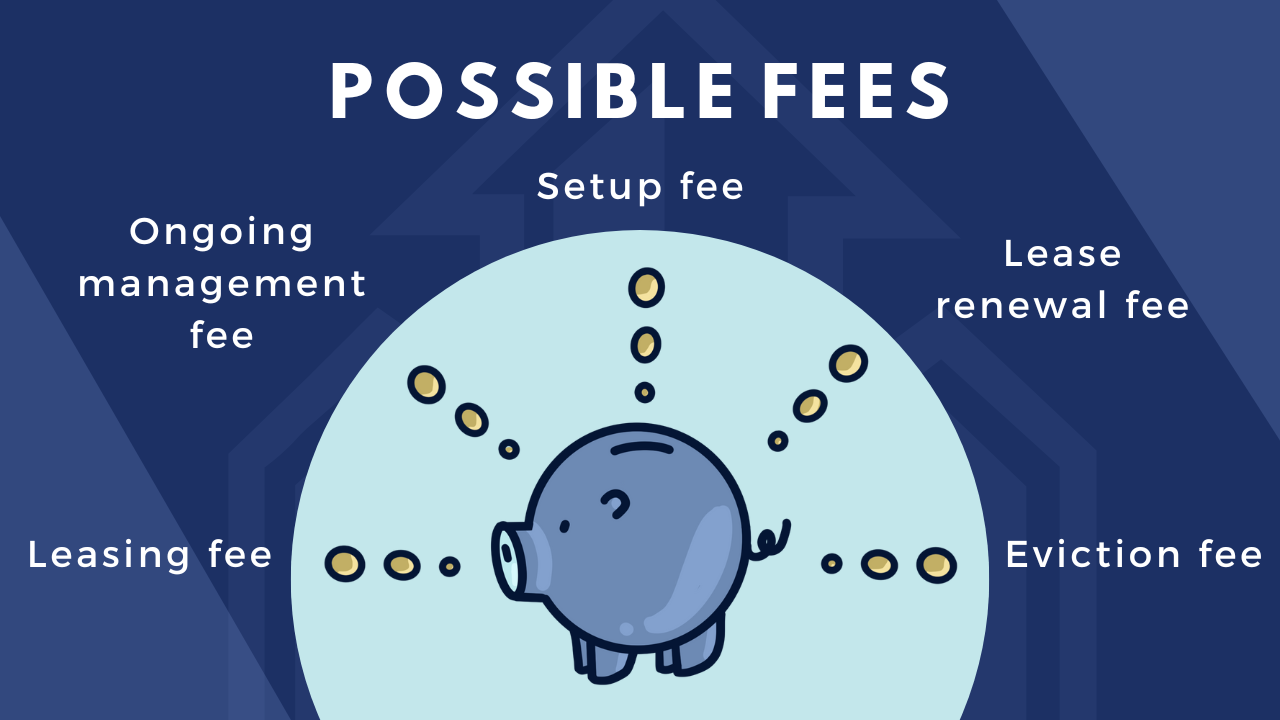
Once you have solidified your business structure and started attracting new clients, the next step is to establish your fee structure. This phase is crucial for any business.
Setting prices too low may undermine your credibility and perpetually keep you struggling to meet expenses.
On the other hand, pricing too high could deter high-quality clients and harm your business.
A crucial first step in crafting a fee structure that ensures sustainable income and attracts clients is understanding your local market and competitors’ pricing.
For newcomers to the real estate industry, determining the market value of services often involves researching similar property management businesses in the area to gauge prevailing rates.
Taking this market analysis further involves investigating not only competitive prices but also the unique fees and payment structures common in the industry.
Since fees can vary by city, it is essential to focus your search rather than relying solely on generic online guidelines.
When establishing your pricing structure, consider various fees, including:
- Setup Fee: A one-time fee property owners pay to set up an account, typically ranging from $200 to $300.
- Ongoing Management Fee: The primary source of monthly income, usually 3-10% of the property’s monthly rental income, covering daily operational costs.
- Leasing Fee: Charged when a unit becomes vacant, typically equivalent to one month’s rent or a portion thereof.
- Lease Renewal Fee: Occasional fee paid by tenants when renewing existing leases, typically a few hundred dollars.
- Eviction Fee: Optional but advisable if acting as the property owner liaison during an eviction process.
We recommend that you tailor your fee structure to the type of clients you aim to attract.
For instance, managing large buildings may require a fee structure that accommodates a higher tenant turnover rate and emergency repair demands.
Similarly, single-family homes or high-value properties may require additional maintenance fees or convenience charges.
Regardless of your pricing approach, ensure that your rates reflect the quality of service provided. Consistently delivering top-tier service to all clients will enhance your business reputation and drive overall profitability.
FREE Training: How to Launch Your Property Management Company
7. Prioritize Customer Service and Adaptability
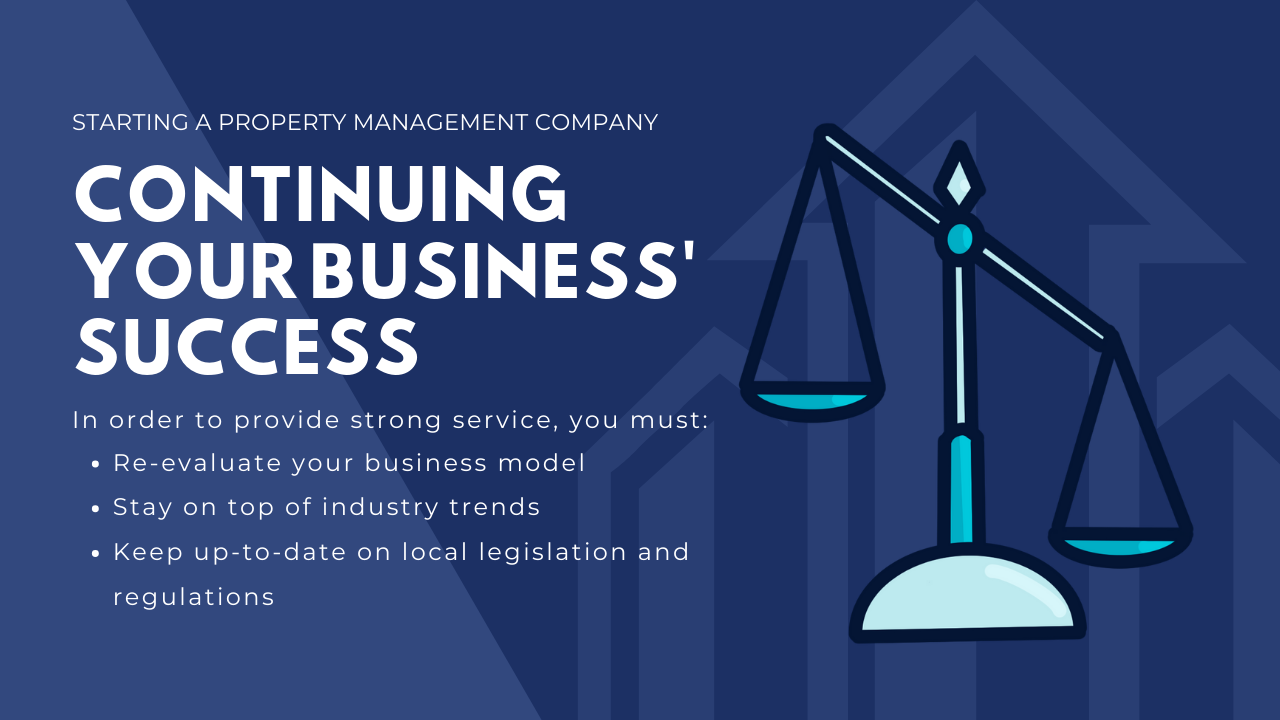
At the end of the day, it is absolutely crucial that every property management company in Indiana continues to deliver top notch services to their clients if they want to succeed in the long run.
After all, if your clients are unhappy, you may have a tough time keeping them long term and earning a reliable income.
To combat this, continuously evaluate and improve your business model, staying on top of industry trends and your local regulation changes.
Emphasize strong customer service and adaptability within your team, and always do what you can to improve your operations whenever needed.
Launching a property management company in Indiana may present challenges, but with thorough planning, adherence to regulations, and a commitment to excellence, you can build a successful company that stands the test of time.
By following these steps, you will be well-equipped to navigate the industry and establish a thriving property management business in Indiana.
If you have any further questions on how to start your property management company, or if you want to know more about anything related to property management, contact our team at Upkeep Media today.



